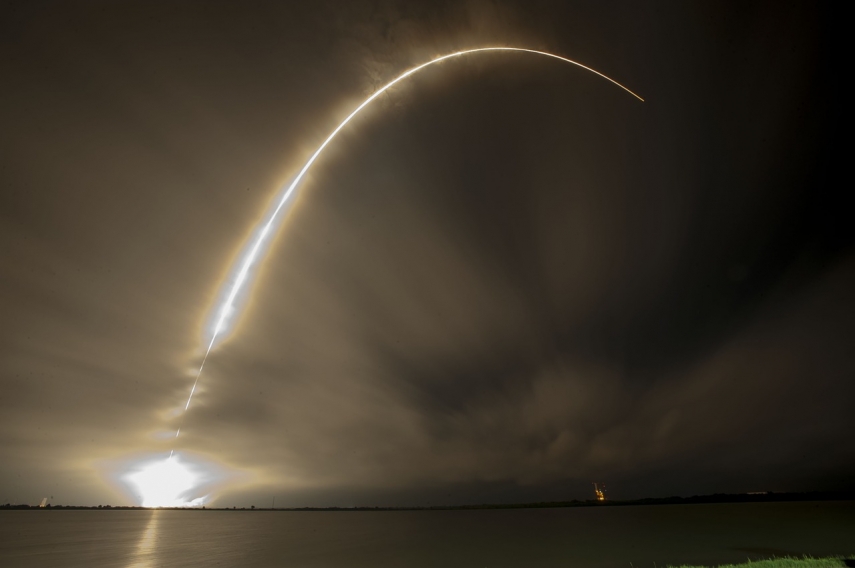
Russia’s Offshore ‘Missile Tests’: Psychologically Undermining the Economic Security of the Baltics
Russia’s Offshore ‘Missile Tests’: Psychologically Undermining the Economic Security of the Baltics
In the past two months, the Russian government twice warned Latvian authorities that it was planning to conduct missile tests over Latvia’s exclusive economic zone (EEZ) in the Baltic Sea. Yet, in both cases (April 4–6 and April 17–19), Russia never actually shot off any live missiles during these “exercises” (Tvnet.lv, April 20; see EDM, May 2). This raises the question of what was the real purpose of Russia’s activities in the Baltic.
In response to the first Russian announcement about the planned missile tests, the Latvian Ministry of Defense (MoD) summoned Russia’s military attaché in Riga in order to stress the Baltic Sea’s importance for Latvian commerce. The closure of a zone of the Baltic near Latvia’s coast for a period of at least 36 hours would not only harm economic activity but also increase the risk of accidents, the Latvian side argued (The Baltic Times, March 30).
This would not have been the first time Russian offshore exercises negatively impacted Baltic commercial activities. Infamously, neighboring Lithuania has repeatedly faced aggressive Russian naval actions in the Baltic Sea, which, in 2015, curbed civilian shipping traffic in this Baltic State’s EEZ as well as temporarily hindered the construction of the NordBalt electricity cable to Sweden (Thelocal.se, May 2, 2015; The Baltic Times, September 7, 2015, March 31, 2018).
In the short term, at least, the feared deleterious economic effects of Russia’s April 2018 “training” activities have largely not materialized. For example, restrictions in the Baltic Sea airspace did not significantly affect the Latvian national airline AirBaltic’s flight schedule (Tvnet.lv, April 13). Potential foreign investors were also not phased. The British Steel consortium recently voiced a desire to purchase Latvia’s insolvent Liepājas Metalurgs steelworks plant, located on the Baltic coast (Lsm.lv, April 18). Tellingly, Minister of Defense Raimonds Bergmanis remarked that, although the public would like to know whether the closure of the airspace had a significant financial impact on airlines or the shipping industry, currently there is no need to try to make such a calculation (Bnn.lv, April 9).
Nevertheless, some experts have warned that the threat to economic security may only start to become apparent in the long term—in fact Moscow’s aim all along. According to Latvian Foreign Minister Edgars Rinkēvičs, the Russian Navy’s announcements of rocket test firings in the Latvian EEZ (although ultimately unfulfilled) succeeded in drawing heavy anticipatory international media attention. The resulting news narrative could thus be considered a Russian propaganda success and might have long-lasting effects, Minister Rinkēvičs noted (Nra.lv, April 5).
Dr. Didzis Kļaviņš, a senior researcher at the University of Latvia, believes that, in a longer term perspective, such provocative Russian military drills in the Baltic Sea could have direct economic and financial consequences. “Undoubtedly, the exercises that took place so close to Latvia for the first time since the restoration of independence, are a demonstration of Russia’s power in the Baltic Sea region. One of the goals of such activities is to worsen the overall security of the region and to negatively impact the economies of the Baltic States, including levels of incoming foreign direct investment [FDI],” Dr. Kļaviņš argued (Author’s interview, May 11).
Russia’s April sea exercises were not seen as a direct military threat to Latvia or the Baltic Sea region as a whole. Moreover, they had no immediate discernible impact on the economies and financial markets of these countries. And yet, Russia’s activities may nonetheless increase regional tensions and begin to affect the financial behavior of multinational companies, gradually reducing their investment in Latvia and the region as a whole. Kļaviņš stressed that, after repeated such incidents, airlines may start reviewing their flight routes, investments and costs in the Baltic Sea area. “The same is true of other sectors of the economy, and such Russian foreign policy activities could have a negative impact in the long run,” the University of Latvia researcher warned (Author’s interview, May 11).
The Latvian economy has already been struggling with falling rates of foreign direct investment. Last year, the accumulated equity capital FDI in Latvian companies decreased by 56.14 million euros ($66.45 million), lowering the total to 7.23 billion euros ($8.56). In 2015, total FDI reached nearly 8 billion euros ($9.5 billion) (Lursoft.lv, accessed May 3). This economic trend has a clear, albeit indirect, security dimension: as foreign investment drops, the Latvian economy and that of the other Baltic States is weakened, while the commitment of foreign allies toward their economic partners is loosened. This loosening of the Baltic States’ military alliances, in turn, has a destabilizing effect by undermining the deterrence factor on their potential adversary. Illustratively, therefore, when the three leaders of the Baltic States met with United States President Donald Trump in early April, one of the main topics of conversation was economic cooperation (Ee.usembassy.gov, April 3).
Meanwhile, Russia has retained a relatively sizeable position on the Latvian market—a position that could strengthen at the expense of reduced Western trade and investment. Last year, Russia was Latvia’s third largest export market and the fifth largest import partner, with total trade turnover of 2.1 billion euros ($2.5 billion). And as of February 2018, there were 6,000 Russian firms officially registered in Latvia (La.lv, accessed May 3).
While last month’s Russian “missile tests” did not seriously affect regional economies, they did conspicuously raise the topic of economic and investment security in the Baltics. This narrative was directed specifically at audiences across the wider Baltic Sea region and beyond. And though the economic effects of this narrative, either in the short or long term, clearly should not be exaggerated, Moscow’s repeated warnings of “missile tests” off the Baltic coast are emblematic of Russia’s antagonistic foreign policy, which should not be ignored.


